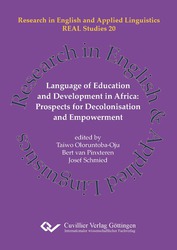| Areas | |
|---|---|
| Serie de libros (97) |
1381
|
| Nachhaltigkeit |
3
|
| Gesundheitswesen |
1
|
| Letra |
2369
|
| Medienwissenschaften | 16 |
| Teología | 57 |
| Filosofía | 102 |
| Derecho | 423 |
| Economía | 851 |
| Ciencias sociales | 417 |
| Ciencias del deporte | 48 |
| Psicología | 233 |
| Educación | 190 |
| Historia | 183 |
| Arte | 111 |
| Ciencias culturales | 166 |
| Literatur | 117 |
| Lingüística | 88 |
| Ciencias Naturales |
5408
|
| Ciencias Ingeniería |
1795
|
| General |
98
|
|
Leitlinien Unfallchirurgie
5. Auflage bestellen |
|
Erweiterte Suche
Language of Education and Development in Africa (Volumen 20) (Tienda española)
Prospects for Decolonisation and Empowerment
Taiwo Oloruntoba-Oju (Editor)Josef Schmied (Editor)
Bert van Pinxteren (Editor)
Previo
Lectura de prueba, PDF (430 KB)
Indice, PDF (140 KB)
Language of Education and Development in Africa … tells the story of Africa‘s apparent linguistic powerlessness, while engaging the prospects of sustained decolonization and empowerment. Reviewing existing pessimistic narratives of the African language situation, and the repercussions of these narratives for development, scholars from different parts of Africa and from Europe weigh in by proposing a change paradigm, and a more optimistic view of the future. Language is critical to development; therefore, painting a static picture of Africa, as one that is forever tethered to colonial languages, is not only untrue but also serves negatively to imit African agency. A triadic new mantra is proposed and pursued in this volume, that is: Change is necessary, change is possible, and change is inevitable. Substantive representations from various parts of Africa are showcased in the book, along with expertise shared by international education communities such as UNESCO and SIL, in order to put forward an exciting new narrative of decolonization and empowerment.
| ISBN-13 (Impresion) | 9783736976214 |
| ISBN-13 (E-Book) | 9783736966215 |
| Formato | A5 |
| Idioma | Inglés, Francés |
| Numero de paginas | 206 |
| Laminacion de la cubierta | mate |
| Edicion | 1. |
| Serie | REAL Studies / Research in English and Applied Linguistics |
| Volumen | 20 |
| Lugar de publicacion | Göttingen |
| Fecha de publicacion | 09.06.2022 |
| Clasificacion simple | Libro de divulgacion |
| Area |
Estudios anglisticos y americanos
|
| Palabras claves | Decolonisation, Empowerment, africa, african languages, politics of language, african education systems, culture, language, empowering, language inequality, Cameroon, linguistic barriers, cultural barriers, Burkina Faso, national languages, sustainable development, Angola, linguistic implications, sociocultural implications, Yoruba slang, Lagos, Nigeria, duelling languages, backlash phenomenon, indigenous languages, equatorial guinea, sustainable language use, teaching practices, language practices, Republic of Congo, amharic language, Ethiopia, language policy, education sites, transformative democracy, Dekolonisierung, afrikanische Sprachen, Sprachpolitik, afrikanische Bildungssysteme, Kultur, Sprache, sprachliche Ungleichheit, Kamerun, sprachliche Barrieren, kulturelle Barrieren, nationale Sprachen, nachhaltige Entwicklung, soziokulturelle Auswirkungen, duellierende Sprachen, Backlash-Phänomen, indigene Sprachen, nachhaltige Sprachverwendung, Unterrichtspraktiken, Sprachpraktiken, amharische Sprache, Bildungsstandorte, transformative Demokratie, education, Bildung, mother-tongue, Muttersprache, Mehrsprachigkeit, Intellektualisierung, intellectualization, Sprachgemeinschaft, Speech Community, Morphosyntaktik, Slang, morphosyntactics, teacher training, Lehrerausbildung, Sprachökologie, Glottopolitik, Soziolinguistik, Ethnizität, ethnicity, Alphabetisierung, literacie, Globalisierung, globalisation, Arbeitssprache, working language |








